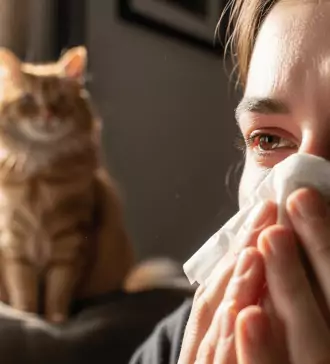

Best Hypoallergenic Cat Breeds For Allergy Sufferers
by Nida Hammad
Last updated: November 4, 2025
Verified and Approved by:
Angela Morris,
MSW, LCSW
Fact Checked

Are you an avid cat lover who dreams of adopting a furry friend but is held back by pesky allergies? Don’t fret! The world of feline companionship isn’t off-limits for allergy sufferers. Contrary to popular belief, certain cat breeds exist that are hypoallergenic, meaning they produce fewer allergens or shed less dander, making them more suitable for people prone to allergies.
In this comprehensive guide, we’ll delve into the fascinating realm of hypoallergenic cats and explore the top breeds perfectly tailored for those seeking a feline companion without the discomfort of allergies.
What causes cat allergies, fur or something else?
Cat allergies are mainly caused by a protein called Fel d 1, found in a cat’s saliva, skin, and urine, not their fur. When cats groom, this protein spreads to their coat and dander, which then disperses into the air. Even hairless cats can cause reactions, since Fel d 1 isn’t dependent on fur. This is why allergic symptoms can occur even if you don’t directly touch a cat.
Research highlights that Fel d 1 production can vary significantly among individual cats. Notably, neutered males produce three to five times less of this allergen compared to their intact counterparts, and female cats typically produce less than males.
Are Any Cats Truly Hypoallergenic?
While there are no completely hypoallergenic cats, some breeds are known to produce less Fel d 1 protein, thus triggering fewer allergy symptoms.
Siberians may naturally produce lower levels of Fel d 1, the main protein that triggers allergic reactions, while Sphynx cats, which don’t shed fur, still produce allergens through their skin and saliva.
It’s important to remember that all cats, even hairless ones, produce allergens found in their saliva, skin, and urine. Lack of fur means less shedding around your home, but it doesn’t mean an allergen-free cat.
There’s no such thing as a completely hypoallergenic cat, but some breeds, like the short-haired Siamese, may be more manageable for those with mild allergies due to their lower shedding.
Ultimately, every cat and every allergy sufferer is unique, so hands-on experience is your best guide before bringing home your new feline friend.
Since allergic reactions vary from person to person, the best way to know if a breed is right for you is to spend time with the cat before bringing them home. Your immune system’s response will always be the ultimate test.
Best Hypoallergenic cat breeds
Maine Coon
If you’re looking for a cat breed that won’t trigger your allergies but also has a majestic and captivating presence, then the Maine Coon is the perfect choice for you. According to reports, Purebred Maine Coon kittens will cost anywhere between $1,000 – $2,000.
These gentle giants are known for their impressive size and fluffy coats, but don’t let their size fool you – they’re just big softies at heart. With their tufted ears and expressive eyes, Maine Coons have a way of captivating everyone they meet.
Plus, their long, shaggy fur is hypoallergenic, meaning you can cuddle up with your furry friend without worrying about sneezing fits and itchy eyes.
But it’s not just their hypoallergenic coats that make Maine Coons stand out. These cats have personalities as big as their bodies! They’re known for being friendly, pleasant, and playful, making them the perfect companion for kids and adults.
Maine Coons are also brilliant and love to engage in interactive play, so be prepared for hours of entertainment and laughter. And let’s not forget about their impressive hunting skills – these cats are natural-born hunters, so you won’t have to worry about pesky critters invading your home.
So if you’re in the market for a hypoallergenic cat that will keep you entertained and allergy-free, look no further than the majestic Maine Coon.
Siberian
When choosing a cat that won’t trigger your allergies, you’ll be thrilled to discover the Siberian breed. These fluffy felines are not only stunningly beautiful, but they also have a unique protein in their saliva that makes them hypoallergenic.
Yes, you heard that right! These cats have a built-in defense mechanism against allergy-inducing proteins.
Not only are Siberians hypoallergenic, but they are also known for their playful and friendly nature. They love to be around their human companions and are great with children and other pets.
So you will be able to enjoy a cat without sneezing up a storm and have a furry friend who will keep you entertained for hours on end.mWith their long, flowing fur and striking eyes, these cats are like walking pieces of art. They will be the envy of all your friends.
So, if you’re an allergy sufferer who has always dreamed of owning an emotional support animal, look no further than the Siberian breed. They are hypoallergenic and the perfect mix of beauty, playfulness, and companionship.
Sphynx
To truly experience the unique companionship of a Sphynx, you must be prepared for the distinctive appearance and care requirements of owning one. These hairless wonders may look ordinary, but they make up for it with their playful and affectionate nature.
Here are a few things you should know before bringing a Sphynx into your life:
- They may be hairless but still require regular bathing to keep their skin clean and healthy. Plus, who doesn’t love giving their cat a spa day?
- Sphynx cats have a higher body temperature than other breeds, so be prepared for cozy cuddles. It’s like having your very own little space heater!
- Don’t be surprised if your Sphynx becomes the star of the show wherever you go. These attention-seeking kitties love being the center of attention and are sure to turn heads.
- While they may not have fur, Sphynx cats still produce allergens, so it’s essential to spend some time with them before bringing one home to ensure you’re not allergic to them.
- Just because they don’t have fur doesn’t mean they’re low-maintenance. Sphynx cats still require regular grooming to keep their skin healthy and free of oil buildup.
While hairless cats, like the Sphynx, still produce the protein Fel d 1, they can provide an advantage. Because they don’t shed, they tend to spread less dander throughout the home, which might be beneficial for allergy sufferers.
So, if you’re ready to embrace the unique charm of a hairless feline, a Sphynx might be the perfect addition to your family. Just be prepared for extra maintenance and a lot of love!
Siamese
Siamese cats are not only striking in appearance but also make an appealing option for allergy-sensitive households. While no cat is completely hypoallergenic, Siamese cats are often considered more manageable for individuals with mild allergies. Some sources suggest they may produce less of the Fel d 1 protein, the primary allergen found in cats, though this claim remains anecdotal. Additionally, their short, fine coat sheds minimally, which helps limit allergen spread in the home.
One of the biggest benefits of owning a Siamese cat is their low-maintenance grooming needs. Their sleek coat typically requires just a weekly brushing to stay clean and healthy. Still, Siamese cats are famously affectionate and may enjoy the bonding time that comes with extra grooming sessions.
Known for their deep blue eyes, large ears, and unmistakable vocalizations, Siamese cats are highly social and thrive in homes where they receive plenty of attention. They’re curious, loyal, and love to be part of the daily routine.
For allergy sufferers seeking a low-shedding cat with a big personality, the Siamese offers a great balance of beauty, intelligence, and manageable grooming.
Javanese
Javanese cats are a top pick for allergy sufferers looking for a playful, affectionate, and low-shedding feline companion. Despite their elegant medium-length coat, they shed very little, which helps minimize the spread of allergens around the home. With regular brushing, you can further reduce dander and keep their coat smooth and free of tangles.
Closely related to the Balinese and Colorpoint Shorthair, Javanese cats share the Siamese’s striking appearance, complete with almond-shaped eyes and a lean, muscular build. They’re known for their intelligence and agility, often found leaping to high places or investigating cabinets with curious precision.
Personality-wise, Javanese cats are sociable and vocal. They thrive on interaction and will often carry on full conversations with their humans. Their lively, talkative nature makes them engaging pets that enjoy being in the spotlight.
For those seeking a hypoallergenic breed with charm, brains, and beauty, the Javanese is a standout choice. Their affectionate temperament and minimal allergen output make them a joy to live with for both cat lovers and allergy-sensitive households.
Russian Blue
Russian Blue cats are a great option for allergy sufferers thanks to their dense, low-shedding coats. Their short fur traps allergens close to the skin, which helps reduce the amount released into the air.
Though they groom themselves well, brushing them regularly further minimizes dander and loose hairs. Combined with simple habits like vacuuming, using a HEPA filter, and washing your hands after petting, owning a Russian Blue can make living with cat allergies much more manageable.
Burmese
Burmese cats are a smart pick for allergy sufferers thanks to their short, silky coats that shed less than many other breeds. While not completely hypoallergenic, they tend to produce fewer allergens, which can make them more tolerable for sensitive individuals.
Beyond their allergy-friendly traits, Burmese cats are sociable, energetic, and love being around people. Their playful nature and affectionate temperament make them a great choice for families looking for a low-shedding, people-oriented pet.
Cornish Rex
The Cornish Rex is a great option for allergy sufferers thanks to its thin, curly coat that sheds far less than typical cat fur. With less loose hair and dander floating around, allergy-triggering particles are reduced in your home.
These cats also produce less dander overall due to the structure of their coats, helping minimize allergic reactions. However, because their skin builds up oil more quickly, Cornish Rex cats benefit from regular bathing to manage allergens.
In addition to being allergy-friendly, Cornish Rexes are playful, affectionate, and enjoy being held, making them charming companions for those with mild to moderate allergies.
Devon Rex
Devon Rex cats are an excellent choice for allergy sufferers, thanks to their fine, low-shedding coat. Unlike many breeds, they don’t require frequent grooming, just a quick wipe-down to manage oils and dander, which helps reduce allergen exposure in the home.
Beyond being allergy-friendly, Devon Rexes are full of energy and love being involved in their human’s activities. They’re playful, affectionate, and known for their mischievous streak and loud purrs. Their engaging personality and easy coat care make them a favorite among those with sensitivities.
Snowshoe
Snowshoe cats are a great option for allergy-prone households due to their sleek, short coat and lack of an undercoat, both of which minimize shedding and help reduce allergen exposure. While they don’t require frequent brushing, occasional grooming supports coat health and limits dander.
One of their unique traits is their love of water. Snowshoes typically tolerate or even enjoy baths, which can help wash away allergens and keep reactions to a minimum.
Known for being affectionate and sociable, Snowshoes thrive on human interaction and tend to get along well with kids and other pets. Their easygoing temperament and low-maintenance grooming needs make them both a hypoallergenic and heartwarming addition to the family.
Ocicat
The Ocicat combines the exotic look of a wildcat with qualities that may suit allergy-sensitive owners. This breed features a short, low-shedding coat, which naturally limits the spread of fur and allergens throughout the home.
Thanks to their reduced dander production, Ocicats may trigger fewer allergic reactions compared to higher-shedding breeds. Maintaining a regular grooming routine, such as wiping down their coat with a grooming cloth, can help remove loose hair and skin cells, further minimizing allergen exposure.
With their striking appearance and allergy-considerate coat, the Ocicat offers a unique and practical choice for cat lovers who don’t want to compromise comfort for aesthetics.
Oriental Shorthair
Oriental Shorthairs are a smart option for allergy sufferers thanks to their low-shedding coats. These elegant cats have short, silky fur that releases fewer allergens into the environment, making them more manageable for people with sensitivities.
Their grooming needs are minimal, regular brushing helps control shedding and keeps their coat sleek and shiny. With less dander in the air, Oriental Shorthairs contribute to a cleaner, more allergy-friendly home.
If you’re looking for a stylish, affectionate cat that’s easier on your allergies, the Oriental Shorthair fits the bill.
Balinese
Balinese cats, often referred to as the “long-haired Siamese,” are an excellent option for allergy sufferers. They are known to produce lower levels of the Fel d 1 protein, a common trigger for cat allergies. Despite their long, silky coats, Balinese cats are light shedders and don’t have an undercoat, making their grooming needs minimal.
A weekly brushing is usually enough to keep their fur smooth and tangle-free. In addition to being allergy-friendly, Balinese cats are intelligent, social, and adapt well to families with children or other pets. Their balanced temperament and graceful appearance make them a beautiful, low-maintenance companion.
Tips for Adopting a Hypoallergenic Cat
While no cat is completely hypoallergenic, breeds like the Siberian and Sphynx are popular with allergy sufferers. Siberians may produce lower levels of the Fel d 1 protein, the main culprit behind cat allergies, while the hairless Sphynx doesn’t shed fur, though allergens are still present in their skin and saliva.
It’s important to note that even hairless cats like the Sphynx, despite their lack of shedding, can still trigger allergies. This is because allergens aren’t just found in fur, they’re also present in a cat’s skin, saliva, and even urine. So, while these breeds may help reduce symptoms, no cat can be considered truly non-shedding or completely allergy-free.
Since allergy responses vary from person to person, it’s always wise to spend time with a breed before committing to adoption.
Do your research: Not all hypoallergenic breeds affect everyone the same way. Meeting the cat in person can help you see how your body reacts before bringing them home.
Talk to your allergy specialist: A quick check-in with your doctor can help you understand your allergy level and whether medications or strategies might help manage symptoms once you adopt.
Keep your home clean: Even low-shedding breeds can leave behind dander and fur on clothes, bedding, and furniture. Regular vacuuming, dusting, and laundry can go a long way in reducing allergens.
Ask your vet: Some cat foods are specially formulated to help reduce allergens in your cat’s saliva and dander. Your vet can recommend whether this approach is worth exploring.
Taking a few thoughtful steps ahead of time can make your life with a hypoallergenic cat smoother, and a lot more enjoyable.
Caring for Active and Intelligent Hypoallergenic Cat Breeds
Some hypoallergenic cat breeds aren’t just allergy-friendly, they’re also little geniuses full of energy. Cats like the Devon Rex, Cornish Rex, Oriental Shorthair, Balinese, Burmese, and Tonkinese thrive on mental stimulation and interactive environments. To keep them happy and healthy, you’ll want to build a routine that keeps both their bodies and minds engaged.
Enrichment and Play
These cats are happiest when they have things to do. Here’s how to keep them entertained:
- Interactive toys: Try puzzle feeders, wand toys, and treat-dispensing balls to keep them mentally sharp.
- Playtime matters: A few short, active sessions each day can help burn off energy and deepen your bond.
- Climbing space: Cat trees, wall shelves, and window perches give curious kitties the chance to explore and observe.
Training and Mental Challenges
Hypoallergenic breeds tend to be smart and eager to please. Clicker training works well for teaching fun tricks like high-fives or agility basics. Keep sessions short, upbeat, and rewarding, small, allergy-friendly treats go a long way.
Grooming for Low-Shedding Breeds
Just because they don’t shed much doesn’t mean you can skip grooming. Regular care helps control dander and keeps their coat (or skin) in top shape.
- Soft brushing: Once or twice a week is usually enough for breeds like the Balinese or Burmese.
- Curly coats: Wipe down Devon and Cornish Rex cats with a damp cloth to manage natural oils.
- Bathing: If your cat doesn’t mind water (hello, Snowshoes!), an occasional bath helps reduce allergens even further.
Companionship Counts
Many of these breeds are incredibly social and don’t like to be left alone too long. If you’re out a lot, consider toys that dispense treats or even adopting a second cat to keep them company. A busy cat is a happy cat, and usually better behaved too
How to Manage and Reduce Cat Allergy Reactions
Living with cat allergies doesn’t mean you have to give up feline companionship. With the right strategies, you can reduce allergen exposure and enjoy life with your pet more comfortably.
Make Your Home Allergy-Friendly
- Keep cats out of the bedroom to limit overnight exposure.
- Use washable covers on furniture to trap and remove dander.
- Vacuum and dust weekly, and use HEPA air filters for cleaner air.
- Scoop the litter box daily, cat urine can also spread allergens.
Talk to Your Vet Before choosing a cat, ask your vet about breeds that may produce fewer allergens. They can also recommend diets shown to reduce Fel d 1 protein in cats, which may ease allergy symptoms.
Groom Regularly
- Brush your cat frequently to remove loose fur and dander.
- Use wipes or schedule baths (some cats, like Snowshoes, even enjoy water).
- Consider professional grooming if home care becomes difficult.
Explore Treatment Options
- Antihistamines can offer short-term relief.
- Immunotherapy (allergy shots) may gradually reduce your immune system’s sensitivity over time.
By combining these practical steps, you can reduce allergy symptoms and maintain a happy, healthy relationship with your cat.
Are There Restrictions on Hypoallergenic Cat Breeds?
Before adopting a hypoallergenic cat breed, especially an exotic one, it’s smart to check local regulations. Some cities, states, or countries (like Australia and New Zealand) have breed-specific rules or import bans to protect native wildlife or manage overpopulation.
Contact your local animal control office or consult organizations like the ASPCA or TICA to avoid any surprises before bringing your new feline friend home.
Cat Breeds Allergy Sufferers May Want to Avoid
While some cats are easier on the allergic, certain breeds are more likely to trigger flare-ups. Cats with long, dense coats or those that shed heavily tend to spread more allergens around the home, especially the Fel d 1 protein found in their saliva and skin.
Here are a few breeds that allergy-prone individuals may want to avoid:
- Persian
Their thick, flowing coats trap dander easily and shed frequently, increasing allergen exposure. - Norwegian Forest Cat
With a dense double coat and seasonal shedding, this stunning breed can be tough on sensitive sinuses. - Himalayan
Related to the Persian, Himalayans have similarly plush coats that require intense grooming and shed year-round. - Manx and Cymric
These tailless breeds are known for their heavy, velvety coats, which can hold on to allergens longer than short-haired cats.
If reducing allergic reactions is a top priority, it may be best to admire these beautiful breeds from afar. Consider opting for a low-shedding, hypoallergenic breed instead.
Frequently Asked Questions
Are Maine Coon cats good with children and other pets?
Maine Coon cats are excellent with children and other pets! They’re gentle giants who love to play and cuddle. Plus, their big, fluffy tails make excellent toys. So, get ready for some adorable chaos!
How often do Siberian cats need to be groomed?
Unlike some other cat breeds, Siberian cats have a low-maintenance grooming routine. You’ll only need to brush their luxurious fur once or twice a week to keep it looking perfect. So relax and enjoy the cuddles!
Can Sphynx cats be prone to any specific health issues?
Oh boy, do Sphynx cats have some health quirks! These little bald beauties can be prone to skin issues, dental problems, and even heart conditions. So keep an eye on your precious little wrinkly friend!
Do Maine Coon cats have any special dietary requirements?
Maine Coon cats have hearty appetites but no special dietary requirements. They’re like a gourmet meal wrapped in fur – a feast for the eyes and the taste buds. So enjoy your majestic foodie feline!
Are Siberian cats known for being vocal and talkative?
Oh, you’ve got a talkative side, huh? Well, you’re in luck because Siberian cats are known for being quite the chatterboxes. They love to have a good meow with their humans. Enjoy the conversation!
Which cat breed is considered the most hypoallergenic?
While no cat is truly 100% hypoallergenic, Siberians and Sphynx cats are often top choices for allergy sufferers. Siberians may produce lower levels of the Fel d 1 protein, the main allergen, while Sphynx cats don’t shed fur, though they still produce allergens through skin and saliva. Reactions vary by individual, so spending time with a breed before adoption is the best way to gauge compatibility.
What should I ask my veterinarian about hypoallergenic cats?
Ask your vet which breeds produce lower levels of Fel d 1, the protein that triggers cat allergies. Certain cat foods are marketed as helping to reduce allergens, but it’s always best to check with your vet before making any switches to your cat’s menu. You can also discuss dietary options that may help reduce allergen production. Finally, share details about your home environment and allergy history so your vet can recommend practical strategies to reduce exposure.
Can allergy shots help with cat allergies?
Yes, allergy shots,also known as immunotherapy,can help reduce sensitivity to cat allergens over time. They work by gradually training your immune system to tolerate the allergen through regular injections. While it’s not a quick fix and usually requires years of treatment, many people see long-term relief. It’s best to consult an allergist to see if immunotherapy is right for your specific allergy profile. If you’re considering living with a cat and you have allergies, it’s a great idea to talk to an allergy specialist.
How much do hypoallergenic cat breeds cost?
Hypoallergenic cat breeds tend to be more expensive due to their specialized traits and popularity. For example, Maine Coon kittens typically range from $1,000 to $2,000. Sphynx and Bengal cats, often cost $3,000 or more. Siberians usually start at around $1,200. Final prices can vary depending on the breeder, location, and lineage.
Certify Your Emotional Support Animal Today

Why You Can Rely on Us?
At Wellness Wag, we believe your pet deserves care rooted in both science and compassion. Each article is carefully researched, written in clear language for pet owners, and then reviewed by qualified professionals to ensure the information is evidence-based, current, and practical for real-life care. Our goal is to help you feel confident in making informed decisions about your pet’s health and well-being.
Reviewed by
Angela Morris, MSW, LCSW
Angela is a licensed clinical social worker with 20 years of experience in patient advocacy and community mental health. She has assisted numerous clients with ESA evaluations and brings a deep understanding of disability accommodations, ensuring that all information is accurate, supportive, and practical.

Written by :
Nida Hammad
Last Updated :
November 4, 2025












